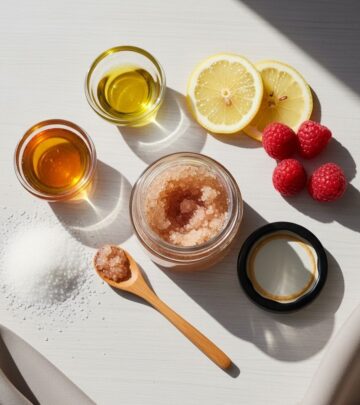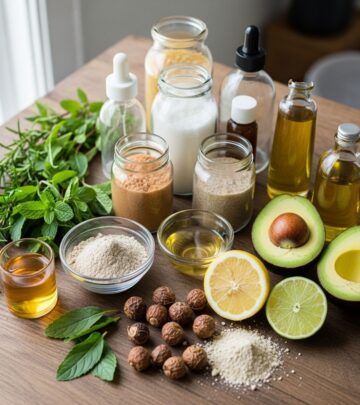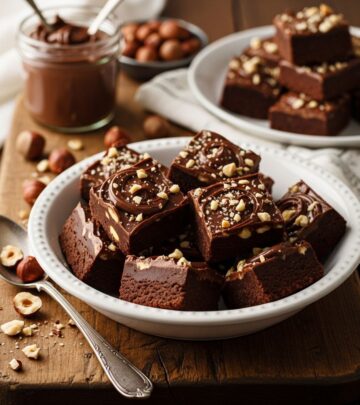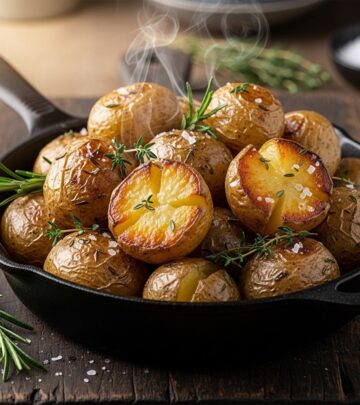The Ultimate Winter Salad: A Colorful Guide to Seasonal Eating
Bringing warmth and nutrition to cold days with vibrant textures and balanced tastes.
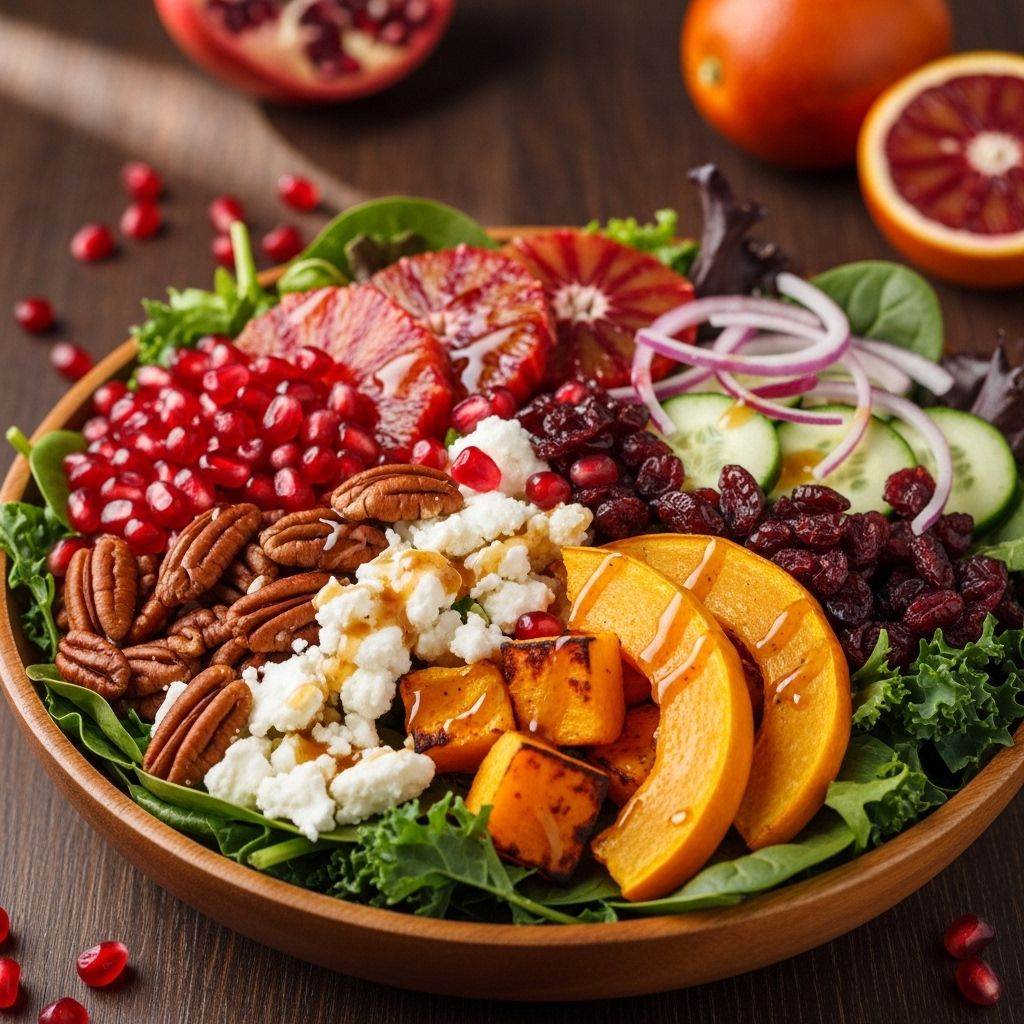
When the chill of winter sets in, fresh vegetables and vibrant salads may not be the first dishes that come to mind. Yet, winter offers unique opportunities to create flavorful and nutrient-rich salads that can stand alone or complement any festive meal. The Ultimate Winter Salad is not just a celebration of seasonal produce, but also of texture, color, and balanced flavors. This guide unveils the secrets behind building the perfect salad for cold-weather months—from choosing the right greens and roasted vegetables to crafting an irresistible vinaigrette and mastering high-impact toppings.
Why Winter Salads?
Winter salads break from tradition by embracing hearty greens, roasted root vegetables, crisp fruit, and robust nuts. The seasonal shift encourages a deeper, richer flavor profile compared to light summer salads. They:
- Highlight immune-boosting ingredients (such as kale, cabbage and pomegranate)
- Offer comforting, filling textures
- Bring vibrant color to the holiday table
- Enable easy meal prep with pre-chopped and roasted ingredients
With the right combination of elements, these salads become a mainstay through the colder months.
Ingredients for the Ultimate Winter Salad
The hallmark of an excellent winter salad is the harmonious pairing of robust greens, sweet and tangy fruits, rich nuts, and creamy cheese. Here are the ingredients:
- Kale (6 oz., shredded)—A nutritional powerhouse, kale adds hearty texture and a deep green hue.
- Shredded vegetables (6 oz.)—Brussels sprouts, cabbage, and carrots bring crunch and earthy sweetness.
- Lemon juice (from 1/2 small lemon)—Brightens up the greens and softens their bitterness.
- Extra-virgin olive oil (1 tbsp for the greens and 1/2 cup for the dressing)—Provides richness and healthy fats.
- Apples (2 medium, cored and diced)—Bring freshness, sweetness and a satisfying crisp bite.
- Goat cheese (1.5 cups, crumbled)—Offers tangy creaminess that harmonizes with the textures of the salad.
- Roasted butternut squash (1.5 cups)—Earthy, subtly sweet, and visually stunning.
- Pecans (1/2 cup, toasted or candied)—Add buttery crunch and a boost of nutrients.
- Pomegranate arils (1/2 cup)—Bursting with color, tartness, and antioxidants.
These essentials create the backbone of the salad, and each can be customized according to taste preferences or availability.
Seasonal Greens: Kale and Shredded Veggies
Kale is a favorite for winter. It maintains its texture under dressing, doesn’t wilt quickly, and packs a nutritional punch with vitamins A, C, and K. Shredded Brussels sprouts, cabbage, and carrots enhance the base with crunch, color, and subtle sweetness.
Fruit Additions
Winter salads often include fruit for an extra layer of taste. Apples provide acidity, and pomegranate arils offer a tart, juicy burst. These fruits balance the earthiness of roasted vegetables and nuts.
Nutty Accents
Pecans deliver nutty richness and texture. Toasting or candying them brings depth and a touch of sweetness, contrasting nicely with tangy cheese.
Cheese Selection
Goat cheese (plain or cranberry-coated) adds a creamy, tangy component that marries well with sweet squash and crisp apples.
Roasted Vegetables
Winter lends itself to roasted vegetables such as butternut squash. Roasting caramelizes the natural sugars, enhancing flavor and contributing warmth to the salad.
Pomegranate Finish
Pomegranate arils not only decorate the salad with their ruby hue but also supply antioxidants and a pop of tartness that balances the richness of other ingredients.
Homemade Maple-Mustard Vinaigrette
A robust, tangy dressing is key to a memorable winter salad. The maple-mustard vinaigrette brings the right blend of sweet, sharp, and savory notes.
- Red wine vinegar (1/2 cup)—Offers acid and bright flavor.
- Dijon or whole grain mustard (4 tsp)—Provides a spicy, earthy kick.
- Pure maple syrup (4 tsp)—Naturally sweetens without overpowering.
- Kosher salt (1 tsp)—Ensures depth and balance.
- Ground black pepper (1/2 tsp)—Adds gentle heat.
- Extra-virgin olive oil (1/2 cup)—Emulsifies and enriches the dressing.
How to make: Combine all dressing ingredients in a mason jar, shake vigorously for 30 seconds, and pour over salad. Dress your salad ahead of time for flavor but toss just before serving to maintain freshness.
Step-by-Step Salad Assembly
- Prep the Greens: In a large bowl, massage shredded kale with lemon juice and olive oil for one minute to tenderize and deepen color.
- Add Veggies and Fruit: Mix in shredded Brussels sprouts, cabbage, carrots, and diced apples.
- Dress: Pour the prepared vinaigrette over the mixture, toss well to combine.
- Top and Decorate: Add pecans, crumbled goat cheese, roasted butternut squash, and pomegranate arils.
- Serve: Present immediately for freshest texture and most vivid color.
Tip: Roasting Butternut Squash
- Dice squash into 1/2-inch pieces.
- Toss with 1 tbsp olive oil and pinch of kosher salt.
- Roast at 425ºF for 15–20 minutes, until browned and soft.
Roasting brings out a deep, caramelized sweetness perfect for winter salads.
Why Prepped Vegetables Are a Game-Changer
Recent trends see supermarkets offering chopped, shredded, cubed, and spiralized vegetables, saving time and encouraging more vegetable consumption. Prepped veggies:
- Make assembly quick and easy
- Keep meals colorful and nutrient-rich
- Enable creative mixing and matching
Use prepped vegetables to maximize flavor and minimize effort.
Customizing Your Winter Salad
While the Ultimate Winter Salad shines as written, it can be tailored to taste, dietary needs, or available ingredients. Consider these variations:
| Ingredient | Suggested Alternatives | Flavor Impact |
|---|---|---|
| Kale | Spinach, collard greens, arugula | Lighter, peppery notes |
| Butternut Squash | Sweet potato, acorn squash, pumpkin | Sweeter, earthier taste |
| Pecans | Walnuts, almonds, sunflower seeds | Varied crunch and flavors |
| Goat Cheese | Feta, blue cheese, ricotta | Different tang, saltiness |
| Pomegranate Arils | Dried cranberries, persimmons | Sweeter, more chewy texture |
The salad’s adaptability is its greatest strength—swap or add ingredients according to preference, and you’ll always have a new creation.
Serving Suggestions
- Main Course: Add grilled chicken or salmon for a balanced meal.
- Side Dish: Serve with roasted meats at holiday gatherings.
- Meal Prep: Keep ingredients separate and combine just before serving to maintain crunch.
Health Benefits
This winter salad excels both in flavor and nutritional value:
- Kale & Cabbage: High in fiber, vitamins A, C, K, and antioxidants.
- Squash: Offers vitamin A, potassium, and beta-carotene.
- Apples & Pomegranate: Boost immunity with vitamin C and polyphenols.
- Nuts: Healthy fats support heart and brain function.
- Goat Cheese: Adds protein and calcium.
Frequent inclusion of these ingredients supports a balanced winter diet.
FAQ: Mastering the Ultimate Winter Salad
Q1: Can I make the salad ahead of time?
A: Yes, assemble the greens and vegetables in advance but keep the dressing and toppings separate until ready to serve for optimal freshness.
Q2: What if I don’t have pomegranate arils?
A: Substitute with dried cranberries, which offer a similar tart-sweet burst and color.
Q3: Is it possible to make this salad vegan?
A: Absolutely—omit the goat cheese or replace with vegan cheese, and ensure your dressing ingredients are all plant-based.
Q4: How do I keep kale from being tough?
A: Massaging the kale with lemon juice and olive oil for a minute tenderizes it and deepens the flavor.
Q5: Can I use other nuts besides pecans?
A: Yes, walnuts, almonds, or seeds all work well and provide different textures.
Q6: What’s the best cheese substitute?
A: Feta cheese is a tangy alternative, or use a vegan cheese if needed.
Expert Tips for Ultimate Salad Success
- Use Fresh Ingredients: Seasonal produce delivers peak flavor and nutrition.
- Customize Toppings: Cranberry-coated goat cheese adds holiday flair, but plain works just as well.
- Roast in Advance: Save time by roasting butternut squash a day ahead and keeping it chilled until needed.
- Shake Vinaigrette Well: Emulsify for a smooth, well-blended dressing; bring to room temp before using if chilled—the oil may solidify in the fridge.
- Serve Immediately: Toss salad right before eating for crispness and vibrant presentation.
Ultimate Winter Salad Recipe Card
| Ingredient | Amount |
|---|---|
| Kale, shredded | 6 oz. |
| Shredded veggies (Brussels sprouts/cabbage/carrots) | 6 oz. |
| Lemon juice | 1/2 small lemon |
| Extra-virgin olive oil | 1 tbsp (greens) |
| Apples, diced | 2 medium |
| Crumbled goat cheese | 1.5 cups (4 oz.) |
| Roasted butternut squash | 1.5 cups |
| Pecans | 1/2 cup |
| Pomegranate arils | 1/2 cup |
Frequently Asked Questions (FAQs)
Q: Can I meal prep this salad?
A: Prep each component separately and toss together just before serving to maintain freshness.
Q: How do I keep the dressing from solidifying in the fridge?
A: Let the jar sit at room temperature for an hour or run under warm water before use.
Q: Are other squash varieties suitable?
A: Yes! Try sweet potato, acorn squash, or pumpkin for different flavors and textures.
Conclusion: Winter’s Bounty in Every Bite
The Ultimate Winter Salad is proof that cold weather need not dampen your creativity or enjoyment of fresh food. Loaded with nutrients and color, it’s as suitable for holiday entertaining as it is for everyday meals. By adapting ingredients, emphasizing texture, and mastering flavor balance, anyone can transform basic winter staples into a show-stopping salad bursting with vitality and warmth.
References
- https://www.thepioneerwoman.com/food-cooking/recipes/a104726/ultimate-winter-salad/
- https://www.thegoodwebguide.co.uk/article/food/7-winning-winter-salad-recipes/22464
- https://www.youtube.com/watch?v=zdO1-ONT5hE
- https://www.thepioneerwoman.com/food-cooking/meals-menus/g37857701/christmas-salads/
- https://tastykitchen.com/recipes/salads/ultimate-winter-salad/
- https://www.thepioneerwoman.com/food-cooking/recipes/a11649/apple-pecan-and-blue-cheese-salad-with-dried-cherries/
Read full bio of Sneha Tete


